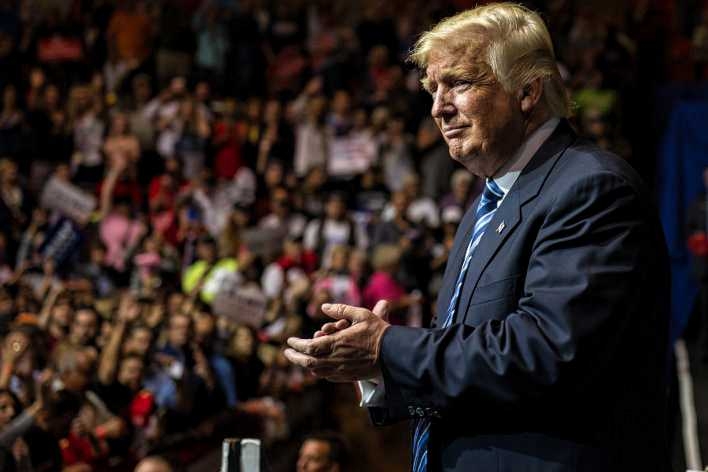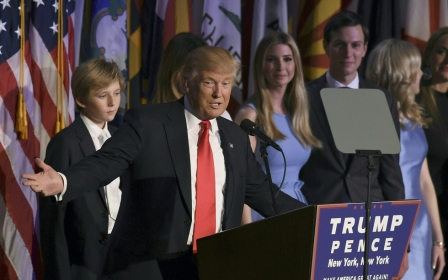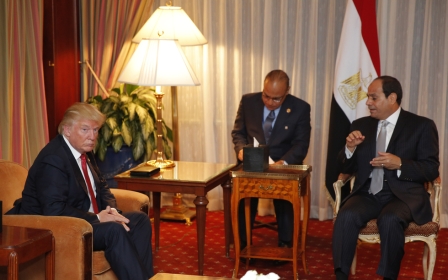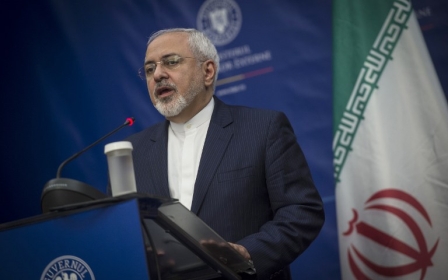In his own words: Donald Trump's stance on the Middle East

As the world reels from the victory of Donald Trump in the US presidential elections, people around the world are attempting to make sense of his political outlook on global issues, regional conflicts and existing alliances.
A look at his previous statements on the Middle East and its leaders might provide some clues as to what he will do as president.
Egypt’s Sisi
When it comes to Egypt, Trump is all praise for Egyptian President Abdel Fattah al-Sisi.
Trump touted the “chemistry” the two politicians shared during a special meeting on the sidelines of the United Nations General Assembly in September.
“I thought it was very productive. He’s a fantastic guy,” Trump said of Sisi.
“I thought it was a great meeting. We met for a long time, actually. There was a good chemistry there. You know when you have good chemistry with people. There was a good feeling between us.”
He went on to praise Sisi’s handling of the Egyptian military coup of July 2013 that removed Egypt’s first civilian president Mohamed Morsi from power, a bloody transition that saw more than a thousand protestors killed.
“He took control of Egypt. And he really took control of it,” Trump said.
Days prior, Trump lavished Sisi with praise, expressing support for the leader’s “strong support for Egypt’s war on terrorism, and how under a Trump administration, the United States of America will be a loyal friend, not simply an ally, that Egypt can count on in the days and years ahead."
In return, Sisi expressed confidence in Trump's leadership and was the first Arab leader to congratulate the president-elect on Wednesday, saying he hoped Trump would "pump new life" into Egyptian-American relations.
Palestinian-Israeli conflict
At first Trump promised to be “neutral” towards Israel and even expressed doubts about whether it made sense to hand Israel billions of dollars annually in military aid. He backed a two-state solution and refused to recognise Jerusalem as Israel’s capital.
But as the electoral campaign rolled on, Trump quickly reversed on his earlier pledge.
As the draft Republican platform was leaked, Trump tweeted that it was the “most pro-Israel of all time”, while avoiding any mention of a two-state solution.
Trump went on to say: “Support for Israel is an expression of Americanism…We reject the false notion that Israel is an occupier.”
He even offered support for Israel’s expansion of illegal settlements in the occupied West Bank.
“I don’t think there should be a pause,” Trump told The Daily Mail on Monday, when asked if he would pressure Israel to pause settlement construction as part of an effort to renew peace talks with the Palestinians. “I think Israel really have to keep going. They have to keep moving forward.”
Syria’s Assad
Throughout his election cycle, Trump has insisted that Syrian President Bahsar al-Assad and his allies are fighting terrorism in Syria.
“I don’t like Assad at all, but Assad is killing ISIS,” declared Trump during the second presidential debate.
For Trump, getting Assad to leave power was less important than defeating Islamic State.
"Assad is secondary, to me, to ISIS," he said.
Russia’s Putin
Trump called Russian President Vladimir Putin a stronger leader than US President Barack Obama at a national-security forum in September.
"If he says great things about me, I'm going to say great things about him," the Republican nominee said.
"I've already said he is very much of a leader. The man has very strong control over his country.
"You can say, 'Oh, isn’t that a terrible thing,' I mean, the man has very strong control over his country.
“Now it's a very different system, and I don't happen to like the system, but certainly in that system he's been a leader, far more than our president has been a leader."
Iran
Despite being an important ally for Syria and Russia in the region, when it comes to Iran, Trump takes a very different tone.
Earlier this year, Trump stated, “I’m not going to tell you right now what I’m going to do with regards to the 'disaster' Iran nuclear deal."
He later declared that he would “rip up” the historic deal that Obama’s administration had painstakingly achieved.
“[The deal was] one of the worst deals I've ever seen negotiated in [my] entire life,” said Trump.
“Iran, the world’s largest state sponsor of terrorism, is now flush with $150bn in cash released by the United States - plus another $400 million in ransom. Worst of all, the nuclear deal puts Iran, the number one state sponsor of radical Islamic terrorism, on a path to nuclear weapons,” said Trump.
Saudi Arabia
Although Trump has declared that he would be willing to protect Saudi Arabia in the event that Iran took military action against it, his words have stirred great controversy among Saudi observers, who said Trump perceives their country as merely “a source of cash”.
“Well, I would want to help Saudi Arabia. I would want to protect Saudi Arabia. But Saudi Arabia is going to have to help us economically. They were making, before the oil went down, now they’re making half, but they were making a billion dollars a day.”
He added that such action against Iran would depend “on what the deal is”.
On another occasion, Trump took to Twitter to deride the Saudi Prince Alwaleed bin Talal, calling him “dopey” and claiming he “wants to control our US politicians with daddy’s money.”
Kuwait
Trump's slurs extend beyond Saudi Arabia to other Gulf states including Kuwait.
"If you look at these nations, they wouldn't be there except for us,” Trump said, referring to the wealthy Gulf states during a conference in New Hampshire in 2011.
“You take a look at Kuwait. I mean, we handed Kuwait back to the people that right now essentially own Kuwait, because it's really ownership more than anything else.
“We handed it back. They never paid us [for ousting Saddam Hussein]," he added.
The Islamic State
Last year, Trump made headlines following a speech he made at rally in Decker Auditorium in Fort Dodge, Iowa.
During an interview on CNN, he elaborated on his strategy to defeat the militant group and their main sources of revenue, namely seized oil fields.
"ISIS is making a tremendous amount of money because they have certain oil camps, certain areas of oil that they took away," Trump said.
"They have some in Syria, some in Iraq. I would bomb the s--- out of 'em. I would just bomb those suckers. That's right. I'd blow up the pipes. ... I'd blow up every single inch. There would be nothing left.”
Middle East Eye propose une couverture et une analyse indépendantes et incomparables du Moyen-Orient, de l’Afrique du Nord et d’autres régions du monde. Pour en savoir plus sur la reprise de ce contenu et les frais qui s’appliquent, veuillez remplir ce formulaire [en anglais]. Pour en savoir plus sur MEE, cliquez ici [en anglais].




